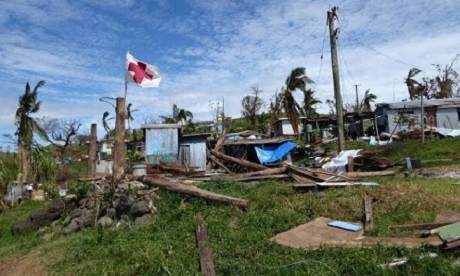Caritas Aotearoa New Zealand’s latest report about the state of the Oceania environment is recording a severe outlook for the region. It also says climate finance for the poor been ‘woefully inadequate’ for seven years.
The Catholic charity has been monitoring five environmental issues affecting people of the Pacific since 2015 through its State of the Environment in Oceania reports.
In conjunction with other Caritas Oceania members and community-based partners throughout the Pacific, the report explains how extreme weather, rising seas and coastal erosion, access to safe local food and water, offshore mining and drilling and inadequate climate finance are all affecting the Oceania environment and impacting on the people who live in the region.
Last week, almost 80 people gathered for Caritas Oceania’s online talanoa (discussion) “Towards our Future Home: Imagining the Future we Need”. The aim was to consider the environmental challenges and solutions facing the region, through the experience of the poor.
In Tonga, Caritas says “Climate change is impacting our lands, coasts, water supplies and weather patterns. In Tonga, we have longer and more frequent droughts … People in low-lying coastal areas are seeing stronger storm, surge and flood events; while saltwater is contaminating groundwater and affecting drinking supplies.”
Cartas Fiji says a similar story is affecting them, where three communities have been relocated and 40 more are in the pipeline for the government plan to relocate them due to the problem of coastal erosion which resulted from sea level rise. A road which was accessible to vehicles up till last year is not accessible anymore because erosion has destroyed it.
The talanoa highlighted the need to use technology appropriately, fully involve youth and indigenous perspectives and to prioritise basic human rights to healthy food and safe drinking water.
“If we look after our land, it will look after us,” said Mina Pomare-Peita, principal of Te Kura Taumata O Panguru. “As Indigenous, we need to take back and understand what time looks like for us. How do we observe the seasons, how do we observe our land, our ocean, our sky, and from there, how do we create solutions.”
In November, thousands of people will gather in Glasgow for the COP26 meeting about the environment.
Strong urgent action is needed to turn things around for Oceania people directly impacted by sea level rise, coastal erosion and extreme weather events, the Caritas report says.
“The urgent transition away from fossil fuels can’t be used to justify other forms of exploitation of people and nature,” said Julianne Hickey, Director of Caritas Aotearoa New Zealand.
“We continue our call for a ban on seabed mining in both national and international waters. The people of Oceania rely on the ocean for their livelihoods. Seabed mining puts all that at risk”.
“The latest IPCC report in August warned of huge climatic changes for us all. But it also signalled, big changes in behaviour by us now could start to make a difference in 20 years,” Hickey says.
“That’s a long time politically, but it’s not a long time to make a real difference for our children’s children.”
Source
Additional readingNews category: New Zealand.




